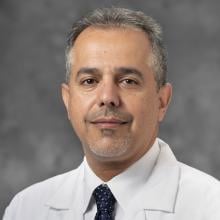As a medical student, do you ever wonder what it’s like to specialize in emergency medicine? Meet Sam Mossallam, MD, an emergency medicine physician and a featured doctor in the AMA’s “Shadow Me” Specialty Series, which offers advice directly from physicians about life in their specialties. Check out his insights to help determine whether a career in emergency medicine might be a good fit for you.
The AMA Specialty Guide simplifies medical students’ specialty selection process, highlights major specialties, details training information, and provides access to related association information. It is produced by FREIDA™, the AMA Residency & Fellowship Database®.
Learn more with the AMA about the medical specialty of emergency medicine.
“Shadowing” Dr. Sam Mossallam
Specialty: Emergency medicine.
Practice setting: Group practice and academic medical center.
Employment type: Employed by Henry Ford Health in Detroit and Southeast Michigan. Henry Ford Health is a member of the AMA Health System Program, which provides enterprise solutions to equip leadership, physicians and care teams with resources to help drive the future of medicine.
Years in practice: 25.
A typical day and week in my practice: I have a mixed role as a physician executive and administrator and an emergency medicine physician. I am the medical director of several divisions and the lead on international patient programs.
A typical weekday for me consists of office hours, meetings, etc. One day per week includes resident education and grand-rounds attendance, and another one or two days per week include shifts in the emergency department, in either an academic inner-city or nonacademic suburban emergency department.
I typically work about 60 hours per week. My evenings and weekends may be busy with emails or telephone work, and occasionally I cover utilization-review activities.
The most challenging and rewarding aspects of emergency medicine: Different settings have different challenges. The urban academic setting has many very complex and critically ill tertiary patients, as well as typical urban environment cases with many behavioral health and socioeconomically disadvantaged people suffering from advanced chronic illnesses. In addition, as it is a busy tertiary care center, emergency department boarding is a major problem, especially for patients with behavioral health needs.
The rewards are numerous. Clinically, the rewards of caring for all patients and providing a safety net for groups that have been economically or socially marginalized is rewarding. The opportunity to help treat and care for very complex patients is also rewarding. Administratively, working to extend Henry Ford Health’s high-quality care to patients abroad, along with expanding knowledge and expertise internationally, is very rewarding. Learning from international collaborators and bringing best practices to Detroit and surrounding communities is too.
The impact burnout has on emergency medicine: Burnout is significant in emergency medicine. Patient boarding, increasing patient complexity, insurance barriers and lack of access to timely outpatient care all lead to an increasingly challenging environment. The opioid epidemic, substance use disorders and increasing lack of access to care for patients with behavioral health needs also add to the burden.
How Henry Ford Health is reducing physician burnout: Henry Ford Health has many processes and initiatives in place to enhance physician wellness and reduce burnout. One example is having behavioral health care integrated virtually with telemedicine. When a patient under a physician’s care is experiencing acute stress and encounters difficulty finding behavioral health services, it can often make their physician feel like they’re alone in trying to meet the patient’s needs. Just knowing there is help available through integrated behavioral health helps physicians experience a sense of relief.
Another example is how Henry Ford Health has removed invasive and unsupportive questions about past mental health diagnosis or treatment from the credentialing application. So instead of asking, “Have you ever been diagnosed with and/or received treatment for a physical, mental, chemical dependency or emotional condition which could impair your ability to practice medicine?” applicants are now asked, “Are you diagnosed with or receiving treatment for any condition (physical, mental, emotional or substance dependence related) that currently impairs your ability to practice medicine?”
How my lifestyle matches, or differs from, what I had envisioned: Having family support and time to exercise and decompress are extremely important in emergency medicine. Time for self-reflection and self-improvement is also necessary. Jobs and programs that offer assistance in this area are ahead of the game. Jobs that also focus on trying to anticipate and assist in the needs of an aging physician workforce are also ahead of the curve—the needs of midcareer and older emergency physicians are quite different from the needs of young physicians.
Skills every physician in training should have for emergency medicine but won’t be tested for on the board exam: The skills that students and young physicians need: soft skills are extremely important. Emergency medicine is a team activity. The ability to communicate well and effectively is key.
Understanding that the work is impossible without the team underscores the need to communicate well with all team members. Adaptability is crucial in emergency medicine, as it is an ever-changing environment. Most days can be very different, requiring a diverse skill set. Time management and the ability to prioritize the critical tasks first are essential. Finally, problem-solving skills are important, not just for clinical issues but also for social and other challenges.
One question physicians in training should ask themselves before pursuing emergency medicine: There are several. Why do I want to have a career in emergency medicine? What is it about the specialty that attracts me to it? What is it about the specialty that might make it difficult for me to have an extensive career in it? What is the ideal practice environment for me and why?
Additional advice I would give to students who are considering emergency medicine: Find mentors in emergency medicine in all stages of their careers who can help guide you during your search for the ideal specialty.




